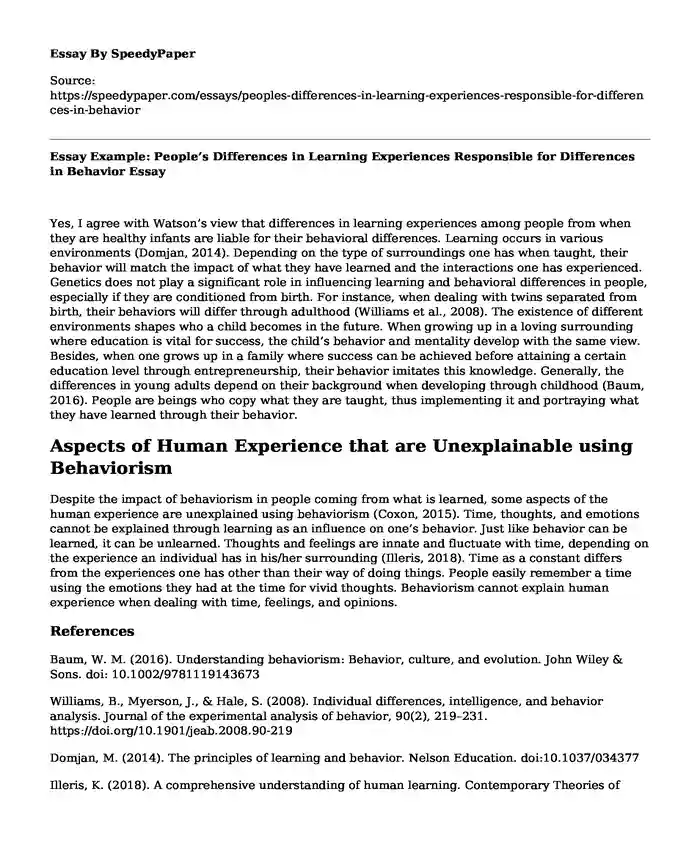
| Type of paper: | Essay |
| Categories: | Genetics Intelligence Human behavior |
| Pages: | 2 |
| Wordcount: | 416 words |
Yes, I agree with Watson’s view that differences in learning experiences among people from when they are healthy infants are liable for their behavioral differences. Learning occurs in various environments (Domjan, 2014). Depending on the type of surroundings one has when taught, their behavior will match the impact of what they have learned and the interactions one has experienced. Genetics does not play a significant role in influencing learning and behavioral differences in people, especially if they are conditioned from birth. For instance, when dealing with twins separated from birth, their behaviors will differ through adulthood (Williams et al., 2008). The existence of different environments shapes who a child becomes in the future. When growing up in a loving surrounding where education is vital for success, the child’s behavior and mentality develop with the same view. Besides, when one grows up in a family where success can be achieved before attaining a certain education level through entrepreneurship, their behavior imitates this knowledge. Generally, the differences in young adults depend on their background when developing through childhood (Baum, 2016). People are beings who copy what they are taught, thus implementing it and portraying what they have learned through their behavior.
Aspects of Human Experience that are Unexplainable using Behaviorism
Despite the impact of behaviorism in people coming from what is learned, some aspects of the human experience are unexplained using behaviorism (Coxon, 2015). Time, thoughts, and emotions cannot be explained through learning as an influence on one’s behavior. Just like behavior can be learned, it can be unlearned. Thoughts and feelings are innate and fluctuate with time, depending on the experience an individual has in his/her surrounding (Illeris, 2018). Time as a constant differs from the experiences one has other than their way of doing things. People easily remember a time using the emotions they had at the time for vivid thoughts. Behaviorism cannot explain human experience when dealing with time, feelings, and opinions.
References
Baum, W. M. (2016). Understanding behaviorism: Behavior, culture, and evolution. John Wiley & Sons. doi: 10.1002/9781119143673
Williams, B., Myerson, J., & Hale, S. (2008). Individual differences, intelligence, and behavior analysis. Journal of the experimental analysis of behavior, 90(2), 219–231. https://doi.org/10.1901/jeab.2008.90-219
Domjan, M. (2014). The principles of learning and behavior. Nelson Education. doi:10.1037/034377
Illeris, K. (2018). A comprehensive understanding of human learning. Contemporary Theories of Learning, 1-14. doi:10.4324/9781315147277-1
Coxon, I. (2015). Fundamental aspects of human experience: A Phenomeno(logical) explanation. Experience Design. doi:10.5040/9781474246170.ch-001
Cite this page
Essay Example: People's Differences in Learning Experiences Responsible for Differences in Behavior. (2023, Sep 24). Retrieved from https://speedypaper.com/essays/peoples-differences-in-learning-experiences-responsible-for-differences-in-behavior
Request Removal
If you are the original author of this essay and no longer wish to have it published on the SpeedyPaper website, please click below to request its removal:
- Free Essay Sample on Theories of Change
- Free Essay: Impact of Colonization on the Gender Politics of Present Day India
- Personal Experience Essay Sample: Being a Single Mother and a Student
- Rhetorical Essay on Graphic Novel, "Superman Red Son"
- Essay Example - Sociology Theory and Emergency Medicine
- Free Essay Example - Time and Discipline
- Free Paper: The Impact of Performance Measurement on Decision-Making to Achieve the Desired Outcomes in Healthcare
Popular categories




